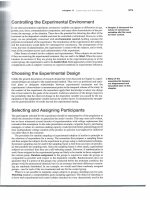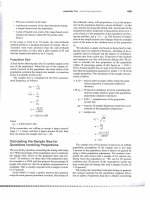Practical Research Methods pot
Bạn đang xem bản rút gọn của tài liệu. Xem và tải ngay bản đầy đủ của tài liệu tại đây (753.29 KB, 169 trang )
Practical Research Methods
Practical books that inspire
Exams are Easy When You Know How
Change your attitude, thinking and technique and never fail an
exam
Essay to Write?
Make it good, make it easy, make it fun!
Writing an Assignment
Effective ways to improve your research and presentation skills
Critical Thinking for Students
Learn the skills of critical assessment and effective argument
Writing Your Dissertation
How to plan, prepare and present successful work
howtobooks
Please send for a free copy of the latest catalogue:
How To Books
3 Newtec Place, Magdalen Road,
Oxford OX4 1RE, United Kingdom
email:
Practical Research Methods
A user-friendly guide to mastering
research techniques and projects
DR CATHERINE DAWSON
howtobooks
For my Dad
First published in 2002 by
How To Books Ltd, 3 Newtec Place,
Magdalen Road, Oxford OX4 1RE. United Kingdom.
Tel: (01865) 793806. Fax: (01865) 248780.
email:
All rights reserved. No part of this work may be reproduced
or stored in an information retrieval system (other than for
purposes of review) without the express permission of the
publisher in writing.
# 2002 Dr Catherine Dawson
British Library Cataloguing in Publication Data
A catalogue record for this book is available from the British
Library
Cover design by Baseline Arts Ltd, Oxford
Produced for How To Books by Deer Park Productions
Edited by Diana Brueton
Typeset by PDQ Typesetting, Newcastle-under-Lyme, Staffs.
Printed and bound by Cromwell Press, Trowbridge, Wiltshire
NOTE: The material contained in this book is set out in good
faith for general guidance and no liability can be accepted
for loss or expense incurred as a result of relying in particular
circumstances on statements made in the book. The laws and
regulations are complex and liable to change, and readers should
check the current position with the relevant authorities before
making personal arrangements.
Contents
Preface ix
1 How to Define Your Project 1
Asking questions 1
The five ‘Ws’ 4
Summary 13
2 How to Decide Upon a Methodology 14
Understanding the difference between qualitative and
quantitative research 14
Summary 22
Further reading 23
3 How to Choose Your Research Methods 27
Interviewing 27
Focus groups 29
Questionnaires 30
Participant observation 32
Choosing your methods 33
Summary 37
Further reading 38
4 How to Conduct Background Research 40
Primary research and secondary research 40
Summary 45
Further reading 46
5 How to Choose Your Participants 47
Sampling 47
Sample size 49
Summary 53
Further reading 54
6 How to Prepare a Research Proposal 55
The contents of a proposal 56
v
What makes a good proposal? 60
Reasons why research proposals fail 61
Summary 62
Further reading 63
7 How to Conduct Interviews 64
Methods of recording 64
The interview schedule 67
Establishing rapport 70
Asking questions and probing for information 71
Summary 73
Further reading 75
8 How to Conduct Focus Groups 76
The role of the moderator 77
Recording equipment 80
Choosing a venue 81
Recruiting your participants 82
Summary 84
Further reading 85
9 How to Construct Questionnaires 87
Deciding which questionnaire to use 87
Wording and structure of questions 89
Length and ordering of questions 93
Piloting the questionnaire 95
Obtaining a high response 97
Summary 99
Further reading 100
10 How to Carry Out Participant Observation 101
Gaining access 102
Ethics 103
Collecting and analysing information 105
Withdrawal from the field 107
Summary 107
Further reading 108
11 How to Analyse Your Data 110
Deciding which approach to use 110
vi / PRACTICAL RESEARCH METHODS
Qualitative data analysis 111
Quantitative data analysis 121
Measuring data 126
Summary 128
Further reading 129
12 How to Report Your Findings 131
Written reports 131
Written report format 134
Journal articles 140
Oral presentations 142
Summary 143
Further reading 144
13 How to be an Ethical Researcher 146
Treating participants with respect 146
Overt and covert research 147
Code of ethics 150
Summary 154
Further reading 155
Index 157
CONTENTS / vii
L i st o f Illust r a ti ons
Ta bl e s
1. The focus group method: advantages and
disadvantages 30
2. Sources of background information 45
3. Sampling techniques 50
4. Sampling dos and don’ts 52
5. Survey timetable 59
6. Research budget 60
7. Recording methods: advantages and disadvantages 66
8. Strategies for dealing with awkward situations 79
9. Open and closed questions: advantages and
disadvantages 88
10. Using computers for qualitative data analysis:
advantages and disadvantages 122
11. Age of respondents 124
12. Making presentations: dos and don’ts 142
Figures
1. Personal profile form 96
2. Interview summary form 113
3. Focus group summary form 114
4. Qualitative data analysis continuum 115
5. Example list of references 138
6. Code of ethics 153
viii
Pref ace
This book is a practical, down-to-earth guide for people
who wish to conduct research. It is aimed at those new
to research and assumes no prior knowledge of the issues
covered. It will also appeal to those people who have al-
ready conducted some research and who are interested in
finding out more about other research me thods that are
available to them.
For the purpose of this book, research is defined as the
deliberate study of other people for the purposes of in-
creasing understanding and/or adding to knowledge. This
deliberate study could cover many different areas. As a re-
searcher, you might be interested in attitudes and beha-
viour – why do people think in a certain way and why
do they behave in a certain way? Or you might be inter-
ested in numbers – how many people use a service? Per-
haps you need to try to predict how this number of
people could be increased so that you can obtain funding
for your service. Or you might be fascinated by the perso-
nal history of a neighbour and have a bur ning desire to
record her history and pass it on to others.
We all have different reasons for conducting research.
Some of us might have to undertake a project as part of
our course work. Others might have to conduct a study as
part of our employment. Some of us may be fascinated by
something we’ve observed and want to find out more. This
book offers advice on how to turn your ideas into a work-
ix
able project and how to keep motivation levels high, espe-
cially if you have no real inclination to become a research-
er. It discusses the issues involved in thinking about your
research and defining your project, before moving on to
the methods – how do you actually do your research, ana-
lyse your findings and report the results?
Over the decades there has been a great deal of discussion on
what constitutes research, how it should be conducted and
whether certain methods are ‘better’ than others. Although
I have touched upon some of these issues in the relevant
chapters, it is not possible or desirable to go into any greater
detail in this book. Therefore, I have included further read-
ing sections at the end of the relevant chapters for those of
you who wish to follow up these issues.
I have been a researcher since undertaking an MA in Social
Research in 1987. Working within both further and higher
education and as a freelance researcher, I have been involved
in a variety of projects in the areas of education, housing and
community research. I have taught research methods to
adults returning to education and conducted in-house train-
ing for employees who need to carry out their own research.
Becoming a successful researcher is a continual learning
process in which we all make mistakes. So don’t worry if
your first project doesn’t run as smoothly as you might wish.
Instead, remember that undertaking a research project can
be fascinating, rewarding and exciting – I hope that you en-
joy it as much as I have done and I wish you every success in
your project.
Dr Catherine Dawson
x / PRACTICAL RESEARCH METHODS
1
Ho w to DefineYo ur Project
Before you start to think about your research, you need to
ask yourself a few questions.
ASKING QUESTIONS
Why have I decided to do some research?
If the answer to this question is because you have been told
to do so, either by your tutor or by your boss, you need to
think about how you’re to remain motivated throughout
your project. Research can be a long process and take up
much of your time. It is important to stay interested in
what you’re doing if you are to complete your project suc-
cessfully. However, if you want to conduct some research
because something has fascinated you, or you have identi-
fied a gap in the research literature, then you are lucky and
should not have a problem with motivat ion.
How can I remain interested in my research?
The obvious answer to this is to choose a topic which in-
t erests you. Most of you do have this choice within the
limitations of your subject – be creative and think about
something which will fascinate you. However, if you have
had the topic chosen for you, try instead choosing a re-
search method which interests you. As you go on to read
this book you will become more familiar with the different
methods and should be able to find something in which
1
you are interested. For example, mathematics might have
motivated you at school. If so, you may find it interesting
to delve deeper into statistical software. Or you might
have been invited to take part in a focus group for a mar-
ket research company and found it an inter esting experi-
ence. Perhaps now you would find it enjoyable to try
running your own focus group? Or maybe you have been
fascinated by a particular group of people and you would
like to immerse yourself within that group, taking part in
their activities whilst studying their behaviour?
What personal characteristics do I have which might help me to
complete my research?
Think about your personal characteristics, likes and dis-
lik es, st r engths and weaknesses when you’re planning
your research. If you’re very good with people you might
like to think about a project which would involve you con-
ducting in-depth interviews with people who you find fas-
cinating. If you absolutely hate mathematics and
statistics, st eer clear of large survey r esearch. Are you
good at soc ialising? Do people feel at ease with you and
are they willing to confide in you? Or do you prefer to hide
yourself away and number crunch, or spend hours on the
int ernet? All of these personal characteristics suggest a
leaning towards certain types of research. As you read this
book you wi ll find ideas forming – jot these down so that
you can refer to them later when you come to plan your
research.
What skills and experience do I have which might help in my
research?
If your research is to be employment based, the chances
are you will have work experience which you’ll find useful
2 / PRACTICAL RESEARCH METHODS
HOW TO DEFINE YOUR PROJECT / 3
when conducting your research project. This is valid ex-
perience and you should make the most of it when plan-
ning your research. Even if your project is not
employment based, all of you will have other skills and
experience which will help. For example, if you have been
a student for three years, you wi ll ha ve developed good
literature search skills which will be very useful in the re-
search process. Some of you may have developed commit-
t ee ski lls, organisat ion skills and time management
expertise. All of these will be extremely useful in you r re-
search. Think about you r existing skills in relation to your
proposed project as it will help you to think about
whether your knowledge, experience and skills w ill help
you to address the problem you have identified.
Many research projects fail because people don’t take en-
ough time to think about the issues involved before rush-
ing to start the work. It is extremely important to spend
time thinking about your project before you move on to
the plan ning stage. Through careful thought you should
stop yourself wast ing t ime and energy on inappropriate
methods as your research progresses. Consider the follow-
ing example:
EXAMPLE 1: JAMES
James wanted to find out about students’ experiences of
housing in his university town. He designed and sent
out a questionnaire to 1,000 students. When the replies
start ed to come in, he realised that the questionnaires
weren’t generating the type of informat ion in which
he was interested. When he talked through his concerns
with his tutor, it emerged that James was really inter-
ested in attitudes towards, and experiences of, rented
accommodation. His questionnaire had been poorly de-
signed and was not generating this type of information.
He had to scrap the questionnair e and construct an-
other which he combined with a number of one-to-
one int erviews to get more in-depth information. He
had spent thr ee months designing and administering a
questionnaire which had not produced the type of infor-
mat ion he required. If he had spent more time thinking
about the research, especially coming to terms with the
difference between qualitative and quantitative research,
he would have saved himself a lot of time and energy
(see Chapter 2).
THE FIVE ‘WS’
When you start to think about you r research project, a
useful way of remembering the important quest ions to
ask is to think of the five ‘ Ws’:
X
What?
X
Why?
X
Who?
X
Where?
X
When?
Once you ha ve thought about t hese five ‘Ws’ you can
move on to think about how you are going to collect your
data.
4 / PRACTICAL RESEARCH METHODS
HOW TO DEFINE YOUR PROJECT / 5
Wha t?
What is you r research? This question needs to be an-
swered as specifically as possible. One of the hardest parts
in the early stages is to be able to define your project, so
much research fails because the researcher has been un-
able to do this. A useful tip is to sum up, in one sentence
only, your research. If you are unable to do this, the
chances are your research topic is too broad, ill thought
out or too obscure.
Why?
Why do you want to do the research? What is its purpose?
Okay, you might have been told to do some research by
your tutor or by your boss, but there should be another
reason why you ha ve chosen your part icular subject. It
might be solely to do with the fact that you are interested
in the topic. This is a good start as you need to be inter-
ested in your research if you are to keep up your enthu-
siasm and remain motivated. Or you might have
identified a gap in the research literature – this is good
as it shows you have carried out careful background re-
search. Or perhaps you want to t ry to obtain funding
for a particular service or enterprise and you need to do
some research first to find out if there is demand for what
you are proposing.
Whatever you r reason, think very carefully about why you
are doing the research as this will affect you r topic, the
way you conduct the research and the way in which you
report the results. If you’re doing it for a university dis-
sertation or project, does your proposed research provide
the opportunity to reach the required intellectual stan-
dard? Will your research generate enough material to
write a dissertation of the required length? Or will your
research generate too much data that would be impossible
to summar ise into a r eport of the requir ed length? If
you’r e conducting r esearch for funding pu rposes, ha ve
you found out whether you r proposed funding body re-
quires the information to be presented in a spe cific for-
mat? If so, you need to plan your research in a way
which will meet that format.
Who?
Who will be your part icipants? (In this book, people who
take part in research will be called participants or respon-
dents, rather than ‘subjects’, which is a term that I have
never liked.) At this stage of the r esearch process, you
needn’t worry too much about exactly how many part ici-
pants will take part in your research as this will be covered
late r (see Chapter 5). However, you should think about
the type of people with whom you will need to get in touch
with and whether it will be possible for you to contact
them. If you have to conduct your research within a par-
ti cular t ime scale, there ’s little point choosing a topic
which would include people who are difficult or expensive
to contact. Also, bear in mind that the Internet now pro-
vides opportunities for contacting people cheaply, espe-
cially if you’re a student with free internet access.
Where?
Where are you going to conduct your research? Thinking
about this question in geographical terms will help you to
narrow down your research topic. Also, you need to think
about the resources in terms of budget and time that are
6 / PRACTICAL RESEARCH METHODS
HOW TO DEFINE YOUR PROJECT / 7
available to you. If you’re a student who will not receive
t r avel expenses or any other out of p ocket expenses,
choose a location close to home, college or university. If
you’re a member of a community group on a limited bud-
get, only work in areas within walking distance which will
cut down on travel expenses.
Also, you need to think about where you’ll be carrying out
your research in terms of venue. If you’re going to con-
duct int erviews or focus g roups, wher e wi ll you hold
them? Is there a room at your inst itut ion which would
be free of charge, or are you going to conduct them in par-
ticipants’ own homes? Would it be safe for you to do so?
Would you be comfortable doing so? If you’ve answered
‘no’ to either of these last two questions, maybe you need
to think again about your research topic. In 15 years I
have encountered only one uncomfortable situation in a
stranger’s home. It can happen and you must never put
you rself in a dangerous situation. Think very carefully
about whether your chosen topic and method might have
an influence on personal safety.
When?
When are you going to do your research? Thinking about
this question will help you to sort out whether the research
project you have proposed i s possible within your time
scale. It will also help you to think more about your par-
ti cipants, when you need to contact them and whether
they will be a vai lable at that time. For example, if you
want to go into schools and observe classroom practice,
you wouldn’t choose to do this research during the sum-
mer holiday. It might sound obvious, but I have found
some students present a well-written r esearch proposal
which, in practical terms, will not work because the par-
ticipants will be unavai lable du ring the proposed data
collection stage.
Once you have thought about these five ‘Ws’, try to sum
up your proposed project in one sentence. When you have
done this, take it to several people, including your boss
and/or tutor, and ask them if it makes sense. Do they un-
derstand what your research is about? If they don’t, ask
them to explain their confusion, revise your statement
and take it back to them.
I can’t overemphasise the importance of this stage of the re-
search process. If you get it right now, you will find that the
rest of your work should flow smoothly. However, if you get
it wrong, your problems could well escalat e. The following
exercise will help you to think more about these issues.
EXERCISE 1
Have a look at the three projects below and see if you
can spot any potential problems. What questions would
you ask to make the researchers focus in on their pro-
posed project? Do you have any suggestions for the im-
provement of these stat ements?
Statement 1: This research aims to find out what people
think about television.
8 / PRACTICAL RESEARCH METHODS
HOW TO DEFINE YOUR PROJECT / 9
Statement 2: My project is to do some research into Alz-
heimer’s disease, to find out what people do when their
relatives have it and what support they can get and how
nurses deal with it.
Statement 3: We want to find out how many of the local
residents are interested in a play scheme for chi ldren dur-
ing the summer holiday.
Points to consider
Statement 1: This research aims to find out what people
think about television. This proposed project is both
broad and obscure. My first two questions would be:
what people and what television? Then I would ask:
what is the purpose of this research? Who would be in-
terested in the results? TV companies already employ
market researchers to conduct a great deal of research
into public viewing, and they have much larger budgets
available to them. There’s little point in repeating re-
search if it cannot be improved upon.
However, if the researcher has an interest in this parti-
cular issue, or is perhaps on a media studies course,
there are a number of ways in which this research could
become more manageable. The researcher could focus
in on a particular type of programme and/or a particu-
lar type of person. For example, she could decide to
show an Open University progr amme to potential OU
students and find out what they thought about the pro-
g r amme in a series of focus g roups. Or she could
choose children’s programming and find out what tea-
chers think about the educatio nal value of these pro-
grammes. Or she could ask business people what they
think about a programme aimed specifically at the busi-
ness community. Finally, maybe she could ask fellow
students to keep a diary of their television viewing over
a week and then interview them about their viewing ha-
bits.
There are many different possibilities within this field.
The researcher needs to decide exactly where her inter-
ests lie and focus in on those int erests.
Statement 2: My project is to do some research into Alz-
heimer’s disease, to find out what people do when their
relatives have it and what support they can get and how
nurses deal with it.
The main problem with this statement is the grammar.
The topic itsel f is mor e focused as the researcher has
mentioned, specifically, the areas he wishes to consider
– nu rses’ attitudes, car ers’ experiences and avai lable
support. His topic is immediat ely more manageable be-
cause he is only considering nurses or carers who come
into contact with sufferers of Alzheimer’s disease. How-
ever, he needs to think about whether he is going to
consider hospitals, residential homes, or both, and in
what areas. Also, is he going to contact people who
look after their relatives at home?
10 / PRACTICAL RESEARCH METHODS
HOW TO DEFINE YOUR PROJECT / 11
Although, on the surface, this project appears more
manageable, this researcher has a major point to con-
sider. In the UK all social research which is carr ied
out on health care premises comes under the jurisdic-
tion of Research Ethics Committees. These committees
were set up to ensure that research does not harm pa-
tients in any way and that it is done in their best inter-
ests. In the USA a simi lar funct ion is car ried out by
Institutional Review Boards. This means that the re-
searcher would have to get his project approved by
the appropriate committee before he could go ahead
with the research, and it is not guaranteed that his pro-
ject would be given approval. As he would have to sub-
mit a full and detailed proposal to the committee, he
could be conduct ing a lot of pr eliminary work, only
to be turned down. Researchers need to think carefully
whether this is a route they wish to take, and if so, ob-
tain the appropriate advice before committ ing them-
selves.
Statement 3: We want to find out how many of the local
residents are interested in a play scheme for chi ldren dur-
ing the summer holiday.
This project put forward by a tenants’ association ap-
pears to be straightforward and manageable, although
there are still several issues which need addressing. My
first question for this topic would be: do you really want
to find out how many of the local residents are inter-
est ed, or do you want to find out the interests of resi-
dents with children of the appropriate age who would ac-
tually use the scheme? If the latt er is the case, this
narrows down the research population and makes it
more manageable.
Finding out whether someone is interested in something
is not actually the same as finding out whether someone
would use the service. For example, I might think a play
scheme is a good idea for other children as it might keep
them off the streets, but not for my little darlings w ho
are too occupied with their computer. If I said ‘yes, I
am interested’, this could be misleading as I have no in-
tention of using the service. However, if the purpose of
the research is to obtain funding for the scheme, then
the more people who express an inter est, the better,
although the tenants’ association would have to be
careful not to produce misleading information.
I would also find out whether the tenants’ association
was interest ed only in the issue of how many people
were interested in it and would use the play scheme. If
they were doing this research anyway, would it be a va-
luable addit ion t o find out what sort of scheme resi-
dents would lik e, and what activit ies their chi ldren
would like? Would r esidents ha ve any r eservat ions
about sending their children? If they do have reserva-
ti ons, what are they? Who would r esidents want to
run the scheme? Would they be willing to provide help
and support themselves?
12 / PRACTICAL RESEARCH METHODS
HOW TO DEFINE YOUR PROJECT / 13
SUMMARY
X
You must take t ime to think about your research as this
will save you problems later.
X
When you’re thinking about you r research, ask you r-
self the five ‘Ws’:
– What is my research?
– Why do I want to do the research?
– Who are my research participants?
– Where am I going to do the research?
– When am I going to do the research?
X
Sum up your research project in one sentence.
X
Discuss your sentence with your tutor or boss and re-
vise if there is any confusion.
2
How to Decide Upon a
Met hodolog y
Once you have answered the five ‘Ws’ you can go on to
think about how you’re going to do your research. The
first thing you need to do is to think about your research
methodology. This is the philosophy or the general princi-
ple which will guide your research. It is the overall ap-
proach to studying your topic and includes issues you
need to think about such as the constr a ints, dilemmas
and ethical choices within your research. Now that you
have read Chapter 1, some of these issues will be fresh
in your mind. Your research methodology is d ifferent to
your research methods – these are the tools you use to
gather data, such as questionnair es or int erviews, and
these will be discussed in Chapter 3.
UNDERSTANDING THE DIFFERENCE BETWEEN
QUALITATIVE AND QUANTITATIVE RESEARCH
When you start to think ab out your research methodol-
ogy, you need to think about the differences between qua-
litative and quantitative research.
Qualitative research explores attitudes, behaviour and ex-
per iences through such methods as interviews or focus
groups. It attempts to get an in-depth opinion from par-
t icipants. As it is attitudes, beha viou r and exper iences
14









